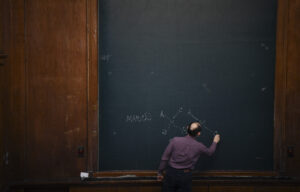Worried about doctors giving fertility-destroying drugs to physically healthy teens? Perturbed by the placing of rapist males alongside female prisoners, or the allowing of any male into a woman’s changing room on his say-so? Annoyed by the sight of hulking men smashing records in women’s sport? Come on — why don’t you admit what you’re really afraid of? The world’s most famous gender-studies guru Judith Butler wants to get inside your head, and she’s even prepared to abandon her famously opaque prose style to do it. The result of her efforts, Who’s Afraid of Gender?, is out this week.
Though she has published prolifically on adjacent topics, it’s been a while since Butler spent a whole book dedicated to her own thoughts on gender. A few things have changed in the interim, including her pronouns (she is now a “they”, though generously prepared to tolerate the former designation) and her sentence lengths, which — at least for the time being — no longer stretch epically to cover whole pages at a time. Still, despite the apparently mass-market ambitions of the new publication, some familiar habits remain.
Not for her the pedestrian business of going through critics’ arguments, providing non-partisan evidence, and patiently exposing internal contradictions and gaps in an understated but cumulatively devastating manner. In the book’s lengthy introduction, she tells us that “of course” she could “provide good arguments as to why looking at gender this way is wrong, which would be useful for educators and policymakers”; indeed, “as an educator” herself, it is “tempting to try and expose and puncture this inflammatory caricature of gender through an intellectual exercise”. Tempted as she might be, however, it turns out that she’s not going to bother with that stuff much. Instead, she wants to give the people what nobody was really asking for: a deconstruction of the “syntactical elements” of the “anti-gender movement”, understood as a “phantasmic scene” according to the “theoretical formulation of Jean Laplanche”.
Translated into ordinary English, Butler is going to put the anti-gender people on the shrink’s couch. She seems unruffled by the fact that, in prosecuting her case, she can’t define “gender” clearly — her most definite pronouncement is that it is “a felt sense of the body, in its surfaces and depths, a lived sense of being a body in the world in this way”. But never mind the pesky details: if you are anti-gender (whatever that amounts to, exactly), then you are very probably a patriarchal racist Christian nationalist nutjob, and also secretly gay. She is probing your unconscious, remember, and understands you better than you do yourself.
Or perhaps — and this is about as charitable as it gets — you are simply a naïve and credulous fool, for whom getting in a moral panic about gay marriage and LGBTQ+ library books acts as a psychic substitute for reasonable fears about climate change and neoliberalism. As such, you are being played by the reactionary rhetoric of various deplorables, including Orbán, Trump, Bolsonaro, various Popes, and er… J.K. Rowling, Holly Lawford-Smith, and Kathleen Stock. (A whole chapter incomprehensibly passes on the heading “More Sex Please, We’re British”, and goes instead for “TERFs and British matters of sex”.)
Though at times the author feigns charitable curiosity about some of her argumentative targets, the attitude never lasts. A sentence about gender-critical feminists that starts with “To be fair” ends up, a mere clause or two later, talking about their supposed affinities with “fascist politics”. There isn’t a single objection lodged against opponents that does not come freighted with the implication of moral taint and/or stupidity. Of course, painting one’s intellectual enemies as cartoon characters is a known tactic of modern transactivism; still, it is shocking to see it done so crudely by someone who retains a high reputation in many quarters.
It is also striking how hackneyed some of the thought is. Butler’s writing in her heyday at least displayed a bit of panache and originality, assuming you could parse it successfully. In contrast, here she comes over as in thrall to established activist tropes, and with all the depth of a TikTok video in places. She even cites Pink News as a source of data. Indeed, if you have spent much time hanging around the so-called “queer community” in the last decade, you will have read many of the talking points in this book already.
Whereas she used to insist, admirably, on fluidity and impermanence in the expression of gender identity, now she exhorts “affirmation” and recognition of “the reality of trans lives”. The chapter on British so-called TERFs is a compendium of smears culled from online teenagers about their gender-critical mums: they are not real feminists; they are effectively racists focusing on a white ideal of womanhood, on the side of “colonialism and empire”; they spread “baseless fears” about vulnerable transwomen; and so on.
Her evidence is carefully cherry-picked and often from partisan sources. There is no real attempt to take seriously the mounting evidence from hospitals and whistle-blowers of medical malpractice against children and teens in the name of “affirmation”; the rising numbers of assaults against women and girls as a result of self-ID; the demoralisation of displaced women athletes; or the physical and psychological pain of detransitioners. (On the latter, she claims that “the regret rates for people of all ages is very small”, based on a single 2021 study that has been heavily criticised since.) Also familiar from arguments with anime avatars on Twitter, we find fatuous whatabouttery: you say you are interested in stopping violence against female prisoners, but why don’t you care about male prison guards raping them? (Er… we do?) As usual, the message seems to be that these things aren’t really happening; and even if they were, they wouldn’t really matter.
Equally though, Butler declares that I personally am bringing “toxicity” and “cruelty to the table” in insisting that a male who declares he is a woman is still not a woman. “Imagine if you were Jewish and someone tells you that you are not. Imagine if you are lesbian and someone laughs in your face and says you are confused since you are really heterosexual”. As a Jewish friend laughingly observed when I first told her about this, there are Jews who spend their whole lives insisting that certain other pretenders are not really Jewish. And, as I ruefully know from personal experience, something similar goes for lesbians too. But in Butler’s histrionic calculations, failing to affirm someone else’s identity claims is apparently more traumatic than anything a surgeon could do to a confused, unhappy trans-identified teenager, or a trans-identified rapist to an already traumatised female prisoner.
She also objects that critics have misconstrued the nature of social construction in previous writing about her work; and that she can and does, in fact, hold that biological sex is “real” (at least, sort of), even if it is also “mutable”. I’ve done my time in the academic salt mines trying to make sense of the contradictions in Butler’s writing so I’ll leave it to others to adjudicate who is right. Instead, I prefer to turn to a more interesting question, made perfectly legitimate by the precedent she herself sets. In producing such a terrible book, what is going on for Butler psychoanalytically? What is she really scared of?
Given their known volatility, one plausible answer is transactivists; a fear also indicated by the author’s submissive observation that her own previously published views on gender have proved “questionable in several ways, especially in light of trans and materialist criticisms”. After all, if what passes for acceptable methodology in your own academic discipline includes shaming others in print for unquantifiable harms to a much-mythologised community, sooner or later a grandee like Butler is bound to fall victim to the practice herself. The more venerable you get, the more likely it is that young pretenders will come for your throne, and they have some scary tools at their disposal. If I were her, I would be frightened too.
But there is also, I suspect, a deeper fear at work here, and an unconscious desire to sublimate guilt. (See how annoying this is, Professor Butler?) The level of projection in this book — by which I mean, attribution of unrecognised features of one’s own behaviour to others, in the Freudian and Jungian sense — is off the scale. Butler sees authoritarian cancellers and enemies of critical thought everywhere, though apparently not so much among those closest to home.
She tells us that in the anti-gender movement, there is a hatred of rational discussion. To say gender is an ideology is, in itself, “an ideological move par excellence”. Whereas gender studies — gender studies, for gods’ sake — is a “diverse field, marked by internal debate”, by contrast its enemies refuse to “read the texts they oppose — or to learn how best to read them” and they “do not hold themselves to standards of consistency or coherence”. It is impossible to convince members of the anti-gender movement “with good arguments because of the fear that the reading will introduce confusion into the reader’s mind or bring her into direct contact with the devil”. To anyone who has ever been no-platformed as a result of transactivist complaints, been put through a disciplinary or worse because of gender-critical views, or even just laboured through one of Butler’s previous sentences, this aspect of the book should come with a health warning.
Still, there is something correct in Butler’s observation that critics of transactivism are getting increasingly intolerant and illiberal. The dominant emotion she attributes to them is fear, but a more accurate description would be fury. It is obvious that many across the world have become angered by the grandiose, narcissistic overreach of academics like her: thinkers indifferent to the real-world havoc wrought by their barmy ideas and impenetrable speech codes, and who pillory all objectors as badly intentioned or deeply confused, no matter what the background reasoning. Butler is right to fear increasing threats towards LGBT people and women across the globe but fails to notice her own significant responsibility in the aetiology of the problem. Speaking personally, I’m not remotely afraid of gender, understood blandly as sexual and bodily expression; but I am very afraid of what Judith Butler has done with it.
Disclaimer
Some of the posts we share are controversial and we do not necessarily agree with them in the whole extend. Sometimes we agree with the content or part of it but we do not agree with the narration or language. Nevertheless we find them somehow interesting, valuable and/or informative or we share them, because we strongly believe in freedom of speech, free press and journalism. We strongly encourage you to have a critical approach to all the content, do your own research and analysis to build your own opinion.
We would be glad to have your feedback.
Source: UnHerd Read the original article here: https://unherd.com/




